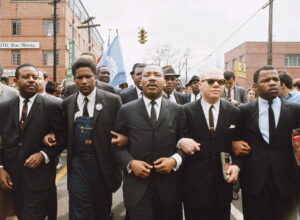Tag: March
Remembering the Legacy of John Lewis: Humanities Forum Held to Review Lewis’s Autobiographical Book
by The Cowl Editor on October 15, 2020
Campus

by Nicole Silverio ’22
News Staff
On the afternoon of Friday, Oct. 2, Nate Powell and Andrew Aydin, who collaborated on the graphic novel March with the late congressman and civil rights activist John Lewis, joined Patrick Breen at the Humanities Forum to discuss their book and the legacy of the legendary civil rights activist and congressman. Breen interviewed Aydin and Powell on their collaboration with Lewis, their personal relationship with him, and Lewis’s legacy.
Lewis passed away in July at the age of 80 after a year-long battle with pancreatic cancer, leaving behind a legacy through his civil rights activism and time in Congress.
During the civil rights movement, Lewis was one of the “Big Six” leaders who organized the 1963 March on Washington. In 1965, he led the first of the three Selma to Montgomery marches. In 1986, Lewis was elected to the U.S. House of Representatives, where he served 17 terms as a representative of the state of Georgia.
March, an autobiographical black-and-white graphic novel trilogy about the civil rights movement, was written by Congressman Lewis and Aydin with illustrations by Powell. The trilogy tells the story of the civil rights protests from Lewis’s perspective. At 15-years-old, Lewis was introduced to a 10-cent comic book called Martin Luther King and the Montgomery Story, which had inspired him to get involved in the civil rights movement. He began by attending meetings at universities weekly to discuss nonviolent protests.
Aydin first met John Lewis while on a job interview during Lewis’s reelection campaign. He was hired and worked alongside Lewis for over 13 years. “The book itself is universally readable,” Aydin said while discussing March. “Comics are going to become ingrained in the educational system and the younger generation.”
Aydin discussed the impact the series has had on young people, who make up a big portion of the book’s readers. Since the work is a graphic novel rather than a traditional autobiography, Aydin says, “We need to show our heroes’ humanity through some form of creativity, the young generation needs a creative leap.” March covers the student sit-ins and the impact of the youth on the civil rights movement.
Aydin reflects on the impact the younger generation has on change, saying, “When you talk about student activism, you think of the young people changing the shape of the world; the success of our book was due to 18-25-year-olds.”
Nate Powell, who served as the illustrator of the book, gave his insight on the trilogy and on John Lewis. Lewis had been an inspiration to Powell since his childhood. When asked by Breen how he came to draw these images to convey a message about the civil rights movement, Powell replied that the book was a process of humanizing the storytelling—it required a delicate balance of an accurate and creative account of its history.
Knowing Lewis personally and remembering his legacy, Powell explains that throughout Lewis’s lifetime, he had a rare ferocity and passion for the things he cared about. “The level of intensity he saw in the world and finding a way to fight the injustice he saw throughout society was truly amazing,” said Powell.
On a similar note, Aydin closed by telling the listeners one thing that Lewis always told him: “Once you lose your sense of fear only then can you be free.” This motto has always stuck with Aydin and is worth remembering.
This Humanities Forum commemorated not only the impactful history of the fight for civil rights in the 1960s, but of one the most important figures of the movement. It is important that we remember Lewis not only this year, but every year going forward, for the legacy he has left behind.
